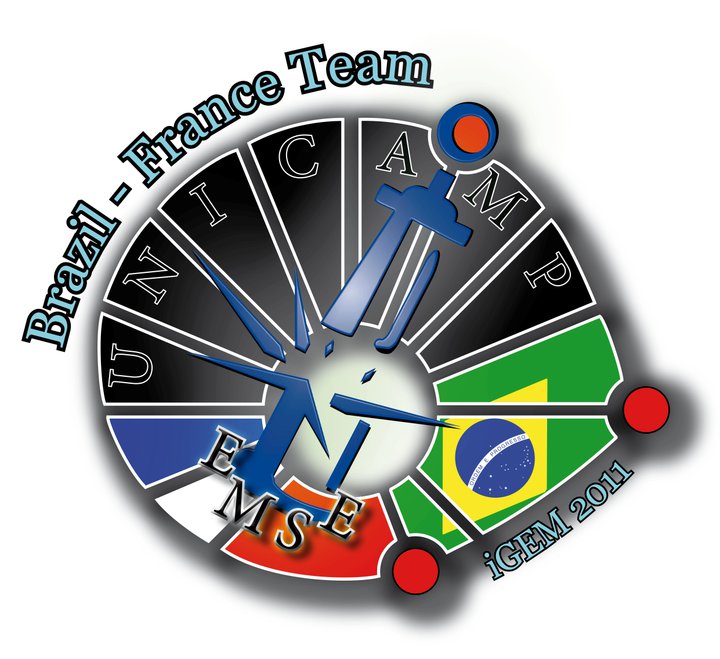
Welcome to the UNICAMP-EMSE team Wiki for iGEM 2011!
Prepare yourselves for a great battle: THE STRESS WARS!
| We are a multi-cultural Franco-Brazilian team composed by students and advisors from UNICAMP (State University of Campinas, Brazil) and EMSE (École Nationale Supérieure des Mines de Saint-Étienne, France). To join iGEM 2011 our team proposes the combination of French and Brazilian students to build two biological devices that will modulate our immune system. This perspective is a strategy with potential application in biomedical therapies, for example, the optimization of the response to various vaccines, as well as the treatment of diseases such as cancer, gut bacterial illnesses and diseases related to excess of Th1 or Th2 lymphocyte lineages. Since stressful situations and various diseases directly affect the balance of our immune system by increasing levels of Catecolamines (CAs), we chose the stress as a model to our current project. We aim to create a Jedi Bacteria that will contain a system that can sense CA levels and produce citokines to regulate the immune system, leading to homeostasis and immune balance.
|  iGEM UNICAMP-EMSE Brazil-France Team logo |
Our project: Stress wars
The human immune system comprises a wide range of cells and mechanisms finely regulated to maintain body's homeostasis against eventual threads. However, pathological conditions, such as stress and autoimmune diseases, can cause imbalances in its action rendering higher susceptibility to potential pathogens. This imbalance is ultimately observed in the biased differentiation of naive T-CD4
+ Lymphocytes towards T-lymphocyte "helper" class 1 (T
h1), in autoimmune diseases, or 2 (T
h2), in stressful condition, favoring cellular or humoral adaptive responses, respectively. This pathological imbalance renders the organism more susceptible to the onset of diseases caused by microorganisms. Thus, a mechanism that counteracts this imbalance is highly desirable. The aim of our project is to use the ability of some microorganisms to sense changes in the host´s body homeostasis, used by them as a signal to trigger expression of virulence factors, to counteract this pathological imbalance. In this sense, the ability of some gut-inhabiting bacteria to sense cathecolamines, which can reach high levels on the gastro-intestinal tract during stress, will be used to trigger the production of IL-12, a potent activator of T
h1, to counteract the preferential differentiation towards T
h2. On the other hand, the ability to sense Nitric-Oxide (NO), a compound released at higher levels in inflammatory conditions, will be used to trigger the production of IL-10, a cytokine with a potent anti-inflammatory action. To switch between both responses, a mechanism that can break down the opposite signaling molecule on the recognition of the first signal will be developed. The microorganism bearing these devices will thus be able to restore the appropriate balance between T
h1 and T
h2 cells in the host's organism, thus counteracting harmful outcomes of this condition and, hence, improving human life quality.

This is Jedi Bacteria, ready to fight against Bad Bacteria


 "
"

